New kit launched at AMES show
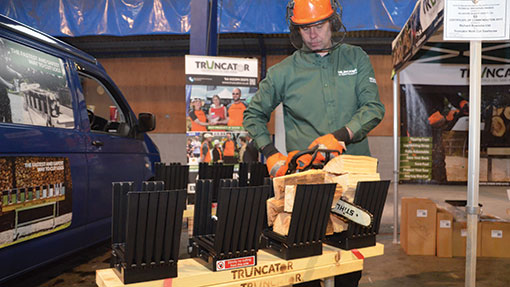
Last week’s Agricultural Machinery and Equipment Show at the Bath and West Showground hosted plenty of kit from all the mainstream manufacturers but also provided a platform for a few more unusual bits of equipment. Nick Fone rounds up the highlights.
Truncator Saw-Horse
When Cumbrian builder and farmer Richard Bowness injured his back a number of years ago, he was unable to lift anything from a low level. While turning over ewes and lifting blocks may have been out of the question, he was determined to find a way of cutting up firewood, so he came up with the Truncator (pictured above).
Essentially a row of hinged plastic cradles bolted to a 9in board on a trestle, lengths of timber are secured with a bungee and then cut into logs with a chainsaw. The spacing of the cradles ensures length is kept uniform and, once they’re all done, each bundle of logs is just tipped into a wheelbarrow. Cost is £25 per cradle or £124 for a ready-made set-up.
Lacotec feed mill
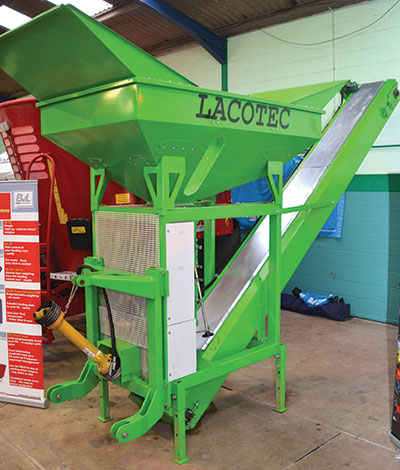 Importer of Lacotec reverse-drive foragers and feed mills, Noble Machinery, based in Somerset, has modified the German firm’s smallest tractor-powered feed mill to dispense material into a trailer or bunker.
Importer of Lacotec reverse-drive foragers and feed mills, Noble Machinery, based in Somerset, has modified the German firm’s smallest tractor-powered feed mill to dispense material into a trailer or bunker.
A hydraulically-driven, endless chevron-belt conveyor lifts the milled grain to a height of 3m. A key advantage of the mill is said to be its ability to handle all types of grain at all moisture levels. Using the same principles as the disc-type “corn-cracker” kernel processor units the company builds for John Deere’s foragers, the mills employ rows of interlocking serrated discs to shatter and smash both dry, hard grain and softer, moist grain for crimping. It’s also said to be fast. Because the surface area of the interlocking discs is about three times greater than a conventional roller mill, it can process material up to three times faster.
Lacotec mills can be supplied in either trailed or mounted formats with a bagging chassis, conveyor or auger discharge. The version on show will handle between 10t-20t/hour and needs a minimum of 75hp upfront. Fitted with the conveyor, it costs £17,500.
Priefert Squeezed Crush
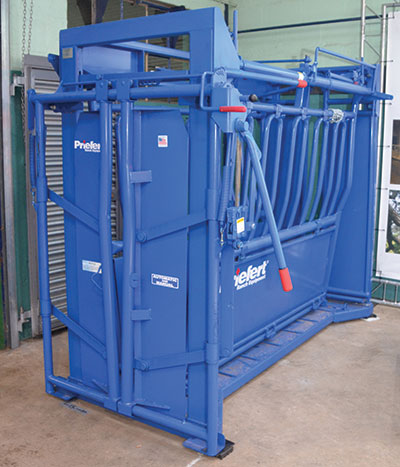 Dairy equipment specialist Kitt Agri, based in Bridgwater, had this Texas-built cattle crush on display at the show. Designed by ranch owners, the Priefert family, it has a clever infinitely variable yoke that automatically adjusts and locks on each animal’s neck.
Dairy equipment specialist Kitt Agri, based in Bridgwater, had this Texas-built cattle crush on display at the show. Designed by ranch owners, the Priefert family, it has a clever infinitely variable yoke that automatically adjusts and locks on each animal’s neck.
The sides squeeze in to lift and cradle the animal to stop it struggling and five drop-gates can each be opened to get clear access to where required. All controls and release catches are accessed from the right-hand side, allowing the left to swing open as a shedding gate or emergency exit. Cost is £3,450.
Morrish muck fork
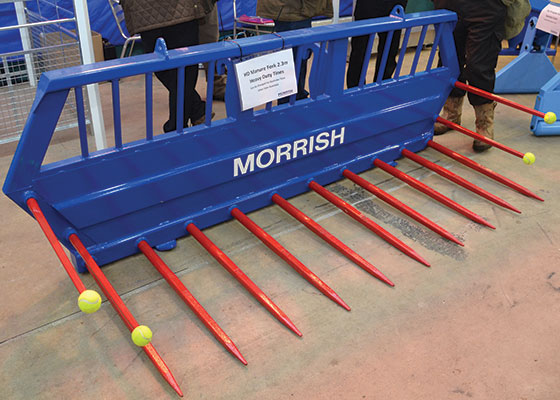 Devon engineering firm Morrish is well known throughout the vegetable industry for its specialist harvesters and is now poised to enter the mainstream machinery market with a line-up of loader attachments and livestock kit.
Devon engineering firm Morrish is well known throughout the vegetable industry for its specialist harvesters and is now poised to enter the mainstream machinery market with a line-up of loader attachments and livestock kit.
Sheep and beef farmers themselves, that’s the area the Morrish family plan to focus on initially, with lambing pens, feed barriers, an access platform, bale squeeze and a muck fork (pictured).
All are bespoke built and available either painted or galvanised, so prices vary but, as an example, a 2.3m-wide muck fork will set you back £1,200.
Holdfast bale trailer
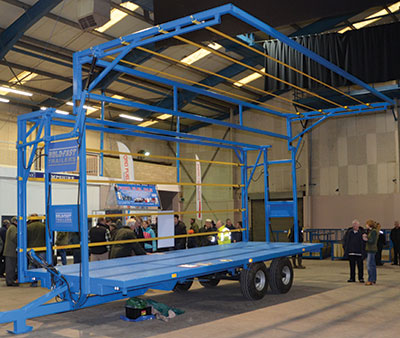 Taking prime position in the main exhibition hall was this clever bale trailer invented by Somerset beef farmer Jonathan King Brain.
Taking prime position in the main exhibition hall was this clever bale trailer invented by Somerset beef farmer Jonathan King Brain.
Based on a standard flat-bed, the Holdfast trailer has two hydraulically folding up-and-over frames that hinge like the gull-wing doors on a 1950s Mercedes.
A telescopic arrangement means each side first lowers and then squeezes in against the deck side-rails. This means that once the bales are loaded, they can be clamped in place in seconds without the need for ropes or straps. It also means bales of all shapes and sizes can be accommodated.
The Holdfast trailer is available in a range of different sizes and specifications but a 12t, 7.6m version will cost in the region of £9,500. The whole arrangement can also be retro-fitted to an existing trailer, the kit costing about £5,000.

